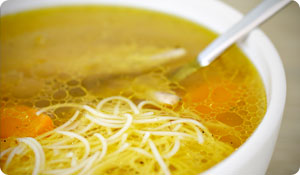
Eating the right foods can help prevent a cold or, at the very least, help you feel better and get well quickly.
More than 500 million cases of the common cold and similar non-flu respiratory infections are reported every year in the United States and, in fact, the rhinovirus that causes colds is the most common infectious disease in humans worldwide. Yet we can't cure it, and in spite of a plethora of over-the-counter and prescription cold medications available, we can just barely relieve the symptoms. That's why prevention is still considered the best medicine.
There are many ways to fight off a cold, including good hygiene (wash your hands often during cold season!), staying away from people who are already infected, and reducing stress to help keep your immune system strong. It is also important to drink plenty of fluids every day, something we often forget to do in cold weather. You can also eat to beat the common cold by including plenty of antioxidant-rich fruits and vegetables, and other immunity-boosting foods, in your diet every day.
Fresh Fruits and Veggies
Using vitamin C supplements to prevent or treat a cold is controversial because clinical studies have shown mixed results. One Japanese study, published in a 2006 issue of the European Journal of Clinical Nutrition, found that vitamin C helps reduce the number of colds but not their duration, and does not reduce the severity of the symptoms.
Using supplements may be controversial, but eating healthy food never is. That's why it's a good idea to get plenty of vitamin C and other antioxidants from fresh fruits and vegetables. Those that are particularly high in vitamin C include citrus fruit, cranberries, sweet red and green peppers, mango, kiwi, tomatoes, Brussels sprouts and leafy green vegetables,. Lother good sources are fruit and vegetable juices fortified with vitamin C.
Yogurt
In a study published in a 2010 issue of the European journal, "Clinical Nutrition," Croatian researchers found that children in day care centers who were given yogurt contain active Lactobacillus GG probiotic culture every day during a three-month intervention period had significantly fewer respiratory tract infections than children who were given a similar product that lacked active cultures. When they did get colds, they were more likely to have a quicker recovery.
Other studies have documented similar results in young and old people who regularly consume yogurt and similar fermented milk products containing various live cultures such as Lactobacillus casei, Lactobacillus acidophilus, and Bifidobacterium amimalis. Many of these "good bacteria" have also been studied and used to treat viral diarrhea.
As with many alternative health care solutions, no one knows exactly how live, active probiotic cultures work to reduce the risk of getting a cold or shorten the durtion once you are infected but the evidence that they do work is enough to encourage researchers to recommend immunity-boosting probiotic products as a means of protection during the cold season.
Chicken Soup
In addition to the pure comfort provided by a warm bowl of soup under almost any circumstances, chicken soup has real benefits when you are suffering from a cold. While it won't prevent you from catching a cold, two clinical studies have shown that chicken soup can ease your symptoms if you get one by moving mucus through your nose more quickly and easing congestion in your lungs.
Sources:
Fendrick, AM; Monto AS; Nightengale; B, Sarnes, M. "The Econimic Burden of Non-Influenza-Related Viral Respiratory Tract Infection in the United States." Archives of Internal Medicine 2003;163:487-494. Web 22 Dec 2010
http://archinte.ama-assn.org/cgi/content/abstract/163/4/487
Hojsak, I; Snovak, N; Abdovic, S; Szajewska, H; Misak, Z; Kolacek, S. "Lactobacillus GG in the Prevention of Gastrointestinal and Respiratory Infections in Children Who Attend Day Care Centers." Clinical Nutrition 2010;29(3):312-316 Web. 22 Dec 2010.
Salminen, S, et al. "Interaction of Probiotics and Pathogens-Benefits to Human Health? Current Opinion in Biotechnology. 2010, 21:157-167 Web. 22 Dec 2010.
http://foodsci.wisc.edu/Summer_Forum_2010/SummerForum2010-1/1.%20Interaction...human%20health-.pdf
UAB Medicine. "Colds (Chicken Soup)." 3 Mar 2008. Web. 22 Dec 2010.
http://www.health.uab.edu/17650/
University of Maryland Medical Center "Vitamin C." 2006. Web. 22 Dec 2010.
http://www.umm.edu/altmed/articles/vitamin-c-000339.htm





